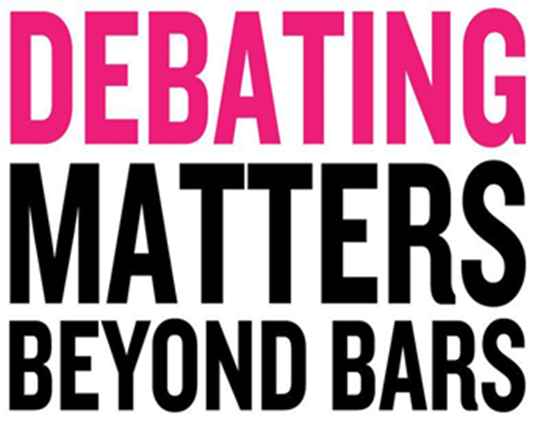Rehabilitating prisoners matters
Debating Matters Beyond Bars has been a fantastic project to get prisoners thinking and helping them to prepare for the outside world as active and able citizens.
In last week’s Spending Review, the chancellor of the exchequer, Rachel Reeves, announced that the government would be providing the Ministry of Justice (MoJ) with an additional £7 billion – with the promise to build 14,000 new prison places by 2031. For many in the criminal-justice system, this is a welcome development. Only last summer, it was revealed that UK prisons were operating at over 99 per cent capacity and many prisoners were released earlier than expected to make room.
But lack of space isn’t the only problem facing our criminal-justice system. In a guest post last year, I asked Ian Acheson to outline some of the ways in which he thinks our prisons are failing and how we can save them. In the Lords, I have continually raised the injustice of the IPP sentences, which have left thousands of people languishing in jail for years beyond their original prison term, comments that were picked up in the Independent.
For many prisoners, however, the overriding issue is one of rehabilitation. How do you reintegrate back into society once you’ve served your sentence? That’s why I was delighted to be asked to chair a special Question Time event as part of the Debating Matters Beyond Bars last month. In this post, my colleague, Mo Lovatt – national coordinator for Debating Matters – describes the programme and its importance.
In April and May this year, Debating Matters took its acclaimed debating competition into HMP Five Wells in Northamptonshire. Initially designed as a schools’ competition, our substance-over-style format has proved valuable in a prison setting, too. By focusing on a range of contemporary topics, prisoners are asked to take themselves and their ideas seriously, to think about issues beyond their current situation, and to look forward to their life ahead – in other words, beyond bars.
A lot of attention has been paid to the crisis in our prison system in the past two years, but very often the subject of ‘rehabilitation’ has taken a back seat in those discussions. Yet, in a liberal society, it is important we focus not just on the punitive aspects of criminal justice but also on how those who’ve committed crimes can be rehabilitated and rejoin society as contributing citizens.
In that sense, being a large training and rehabilitation prison, HMP Five Wells was a great partner for Beyond Bars. The project was designed to support those serving their sentences to focus on the world around them and to learn to use their voice as a way to understand the issues that affect their lives. As one former Beyond Bars participant put it, ‘it’s about learning to use your voice instead of your fist’.
The Debating Matters team worked with around 50 male prisoners at HMP Five Wells, all of whom took part in a series of debate workshops where they learnt how to research and present an argument, how to debate robustly but civilly, and how to ‘steel man’ their own argument. The team worked alongside Alex Waldron, head of learning and skills at Five Wells, and a team of volunteer ‘debate mentors’ – Jacinta Akinlade, Corine Baker, Tracey Bishop, Wayne Brown, Ben Okoli and Luke Vercambre. The workshops focused on developing and honing the necessary skills for participating in a debate and worked in preparation for the tournament, with Debating Matters Topic Guides on:
One of the central tenets of the Debating Matters Beyond Bars Competition is that those serving their sentence are intelligent and robust enough to have their ideas held up to critical scrutiny. And the two event days proved testament to that belief, as the prisoners formed six groups and took part in a day of ‘group stage’ debates to decide which two teams would go through to the final.
The group-stage debates took place on Friday 16 May and Debating Matters invited a number of high-profile figures from across a range of sectors – from criminal justice, politics and law, to the arts, academia and architecture – as guests to judge the competitions and to provide helpful feedback to the debaters. We are grateful to Rick Baraclough and Jo Davidson from HMP Five Wells for contributing to the judging panels of the day, which also included DM regulars, Hilary Salt, Sally Taplin, Austin Williams, Felice Basbøll and Joel Cohen as well as Beyond Bars alumnus and advocate Jonathan Floyd and prison-reform advocate, criminologist and CJS commentator Faith Spear FRSA. We highly recommend Faith’s The Criminal Justice Blog.
At the end of the day, two teams (Team A and Team F) emerged victorious and faced each other head-to-head on the following Friday, 23 May.
The ‘Finals’ day began with a specially convened Beyond Bars Question Time, chaired by Claire Fox with panellists from across the political spectrum: Dr Shahrar Ali, Lord Bailey of Paddington, Inaya Folarin Iman and Roy Lilley, with Gawain Towler joining us for the final debate alongside DM judge Adam Albazy. Panellists were grilled by the prisoners on a range of topics centred on free speech and civil liberties, the economy and cost of living, prisons and the criminal-justice system, international affairs, UK politics and healthcare, education and welfare. As with any group of people, questions and points were raised along the broadest spectrum of views and it was a morning of lively discussion, in good preparation for the final debate, Britain should pay reparations for its colonial past.
To say it was an exhilarating final would be an understatement! But each team rose to the occasion and the audience, made up of fellow inmates and the other teams from the group stages, ensured everyone in the room had a better understanding of the issue and the arguments on either side of the debate. More importantly, each prisoner who took part gained in confidence, learnt how to discuss controversial topics in a reasoned way and became engaged in a range of social issues beyond bars!
We are extremely grateful to everyone at HMP Five Wells for being such enthusiastic partners on this project in particular, Pete Small, Alex Waldron, Tyron Ward, the chaplaincy, catering, education, facilities, security and visits teams. Big thanks are also due to our Debate Mentors – Jacinta Akinlade, Corine Baker, Tracey Bishop, Wayne Brown, Ben Okoli and Luke Vercambre – and to all our judges and debate chairs.
For further information about Beyond Bars, please email mo@ideasmatter.org.uk






“with the promise to build 14,000 new prison places by 2031.” So that’s a non - promise then!